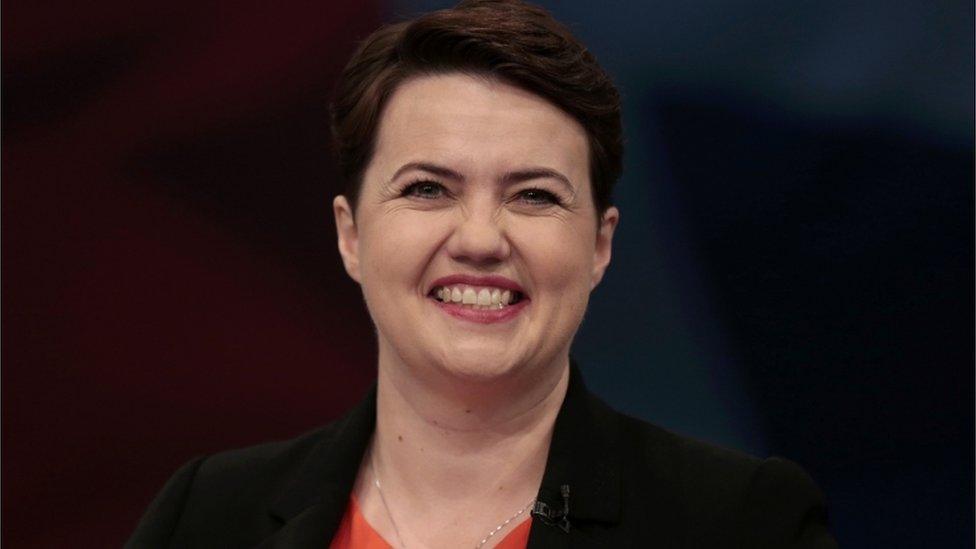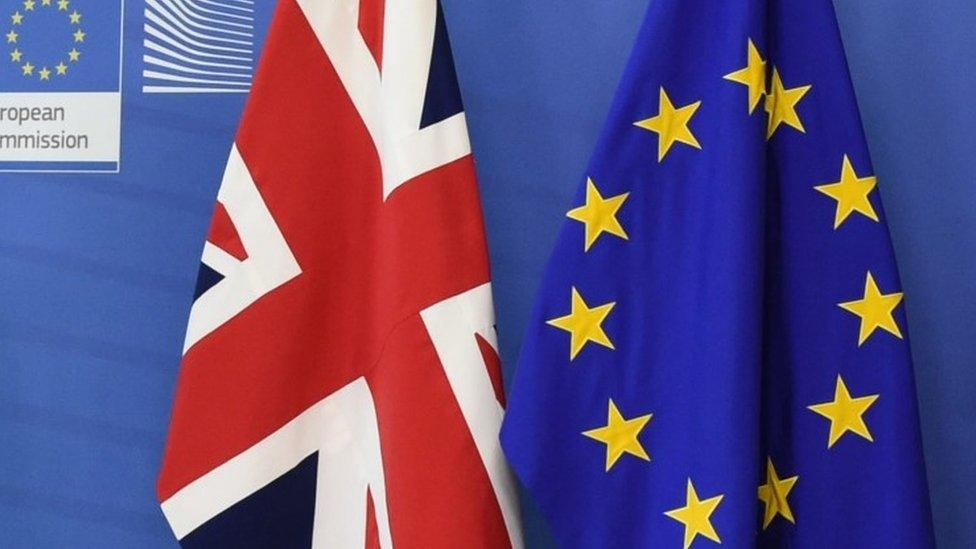The curtains are twitching at Bute House
- Published

She is not, we are told, measuring the curtains at Bute House just yet. Ruth Davidson, that is. The Scottish Conservative leader told her party's conference at Murrayfield that, much as she would like to occupy the First Minister's official residence, she thought it unlikely.
But she hopes to be a fairly frequent guest as the principal Opposition leader at Holyrood.
Consider the strategy here, born of a combination of external circumstance and internal calculation, of both facing reality and seeking to reshape it.
Ruth Davidson's pitch to be the second party at Holyrood is, of course, predicated upon a presumption of who will be first. She is positing the return of Nicola Sturgeon as First Minister. Given the SNP's apparent lead in the polls, that would seem to be at the very least a working proposition.
So how to gain ground for the Tories? The strategy here is to position the Conservatives as the bulwark standing in the way of the SNP.
The Tories calculate that there is a significant section of the electorate who either dislike or distrust the SNP - or, perhaps, simply wish their power to be constrained. Who are seeking balance. The Tories believe there is a mood there to be tapped.
'Tory legacy'
So, in that sense, their pitch derives from the referendum result, however much they may state that they wish Scotland to move on from the referendum period. I believe that desire to be genuine but, nevertheless, the Tories hope to derive a legacy.
The SNP have contrived to corral the 45, the Yes voters, to remain in their camp for the UK General Election and quite possibly the Holyrood contest.
In similar fashion, the Tories hope that a substantial section of the 55, the No voters, can now be recruited to pitch the Conservatives into the role of guarding against untrammelled SNP power.
To do so, the Tories, of course, need to overtake Labour. Rather a big ask - but that is their objective. They pursue this in a range of ways.
Firstly, they suggest that Labour - and the Liberal Democrats - are no longer true, unalloyed Unionists. They make this point by noting that both parties have signalled that members would be free to campaign for independence, should they choose, in a future referendum.
I would suggest that this argument in its pure form is relatively weak. Firstly, Kezia Dugdale and Willie Rennie are not actively encouraging Yes campaigners in their ranks. They are simply acknowledging their potential presence.

Secondly, the Conservatives are pursuing just such an open policy with regard to the referendum on the EU - to the extent that Cabinet members in the UK Government are openly on competing sides.
However, the Scottish Tory pitch may work in another way. If there is a constituency which distrusts the SNP, if that same constituency dislikes the concept of a second referendum, then the Tories may well be able to depict themselves as the most stalwart in standing against that notion.
Then there is the tax question. Ruth Davidson was hugely, hugely tempted to offer an eye-catching tax cut in her manifesto for May's elections. And she insists she remains an advocate of small government and low tax.
But she ruled out the prospect for a series of reasons, having tested the water on the doorsteps. She found that a tax cut was not trusted, not believed. Further, it risked prompting questions about possible cuts in service provision - tricky territory for the Tories.
Thirdly, the ground shifted when Labour and the LibDems proposed a penny increase in income tax for Scotland. The Tories could undercut them without changing the tax rates. They could depict their MSPs as a phalanx against higher tax.
Incidentally, the Scottish Tories will suggest that Scotland should match the plans by the Chancellor for an increase in the threshold at which folk enter the upper rate. That, they suggest, would amount to a tax cut in Scotland - but without altering the parity with the UK upon which they lay stress.
'Reputation for diligence'
In essence, the offer to the voters from the Tories is transactional. It is a deal, a bargain. They are saying: vote for us and we will stand firm against a second independence referendum and against tax rises. We will be a bulwark against these plans.
There is a further factor underlying the Tory offer. And that is Ruth Davidson herself. It was intriguing to notice how often she talked of electing "me and my team". Once an ingénue, she has now gained experience and - the party believes - a reputation for determination and diligence.
It is still a tough sell pitching for the Tories in Scotland. Nobody denies that. But the party strategists believe that she wins respect and, perhaps, can win votes.
The electors will decide whether the strategy is successful. But will it all be subsumed by the European debate? That topic was everywhere at conference. On the floor, on the fringe, in gossipy groups.
The divisions may be honourable within the Tories. But they are stark and they are real. There was, though, some evidence of anger at any who attempted to be over-partisan on this topic at a conference where the immediate objective was to focus upon the Holyrood elections.
The party leadership in Scotland must simply hope that they - and the voters - can operate in silos; can keep the European choice in reserve, pending the Scottish elections on May 5.